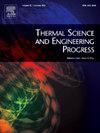An energy efficiency optimization method of an integrated heat pipe cooling system in 5G base stations
IF 5.4
3区 工程技术
Q2 ENERGY & FUELS
引用次数: 0
Abstract
With the development of communication technology, the energy consumption of 5G base stations has increased rapidly. The energy efficiency optimization for 5G base stations has become a crucial task. Addressing the distinctive challenges presented by the small-scale, wide distribution and unattended characteristics of 5G base stations, this study proposes a cabinet-level cooling solution through the utilization of an integrated heat pipe cooling system. Furthermore, an energy efficiency optimization strategy supported by a genetic algorithm-based linear fitting approach has been presented. Experiment was carried out to validate the effectiveness and energy-saving potential of the proposed optimization strategy. The results indicated that the annual cooling load factor (CLF) values of 5G base stations equipped with the integrated heat pipe cooling system and the optimization strategy varies from 0.061 to 0.56 in five typical climate cities in China, which achieves significant energy efficiency. Preliminary estimates suggest that, if this energy efficient technology is widely adopted to the 5G base stations in China, the annual electricity savings could approach nearly 75 billion kWh.
5G基站集成热管冷却系统的能效优化方法
随着通信技术的发展,5G基站的能耗迅速增加。5G基站的能效优化已成为一项至关重要的任务。针对5G基站规模小、分布广、无人值守等特点所带来的独特挑战,本研究提出了一种利用集成热管冷却系统的机柜级冷却解决方案。在此基础上,提出了一种基于遗传算法的线性拟合节能优化策略。实验验证了所提优化策略的有效性和节能潜力。结果表明:在中国5个典型气候城市,配置热管综合制冷系统和优化策略的5G基站年冷负荷系数(CLF)值在0.061 ~ 0.56之间,取得了显著的节能效果;初步估计表明,如果这种节能技术被广泛应用于中国的5G基站,每年可节省近750亿千瓦时的电力。
本文章由计算机程序翻译,如有差异,请以英文原文为准。
求助全文
约1分钟内获得全文
求助全文
来源期刊

Thermal Science and Engineering Progress
Chemical Engineering-Fluid Flow and Transfer Processes
CiteScore
7.20
自引率
10.40%
发文量
327
审稿时长
41 days
期刊介绍:
Thermal Science and Engineering Progress (TSEP) publishes original, high-quality research articles that span activities ranging from fundamental scientific research and discussion of the more controversial thermodynamic theories, to developments in thermal engineering that are in many instances examples of the way scientists and engineers are addressing the challenges facing a growing population – smart cities and global warming – maximising thermodynamic efficiencies and minimising all heat losses. It is intended that these will be of current relevance and interest to industry, academia and other practitioners. It is evident that many specialised journals in thermal and, to some extent, in fluid disciplines tend to focus on topics that can be classified as fundamental in nature, or are ‘applied’ and near-market. Thermal Science and Engineering Progress will bridge the gap between these two areas, allowing authors to make an easy choice, should they or a journal editor feel that their papers are ‘out of scope’ when considering other journals. The range of topics covered by Thermal Science and Engineering Progress addresses the rapid rate of development being made in thermal transfer processes as they affect traditional fields, and important growth in the topical research areas of aerospace, thermal biological and medical systems, electronics and nano-technologies, renewable energy systems, food production (including agriculture), and the need to minimise man-made thermal impacts on climate change. Review articles on appropriate topics for TSEP are encouraged, although until TSEP is fully established, these will be limited in number. Before submitting such articles, please contact one of the Editors, or a member of the Editorial Advisory Board with an outline of your proposal and your expertise in the area of your review.
 求助内容:
求助内容: 应助结果提醒方式:
应助结果提醒方式:


